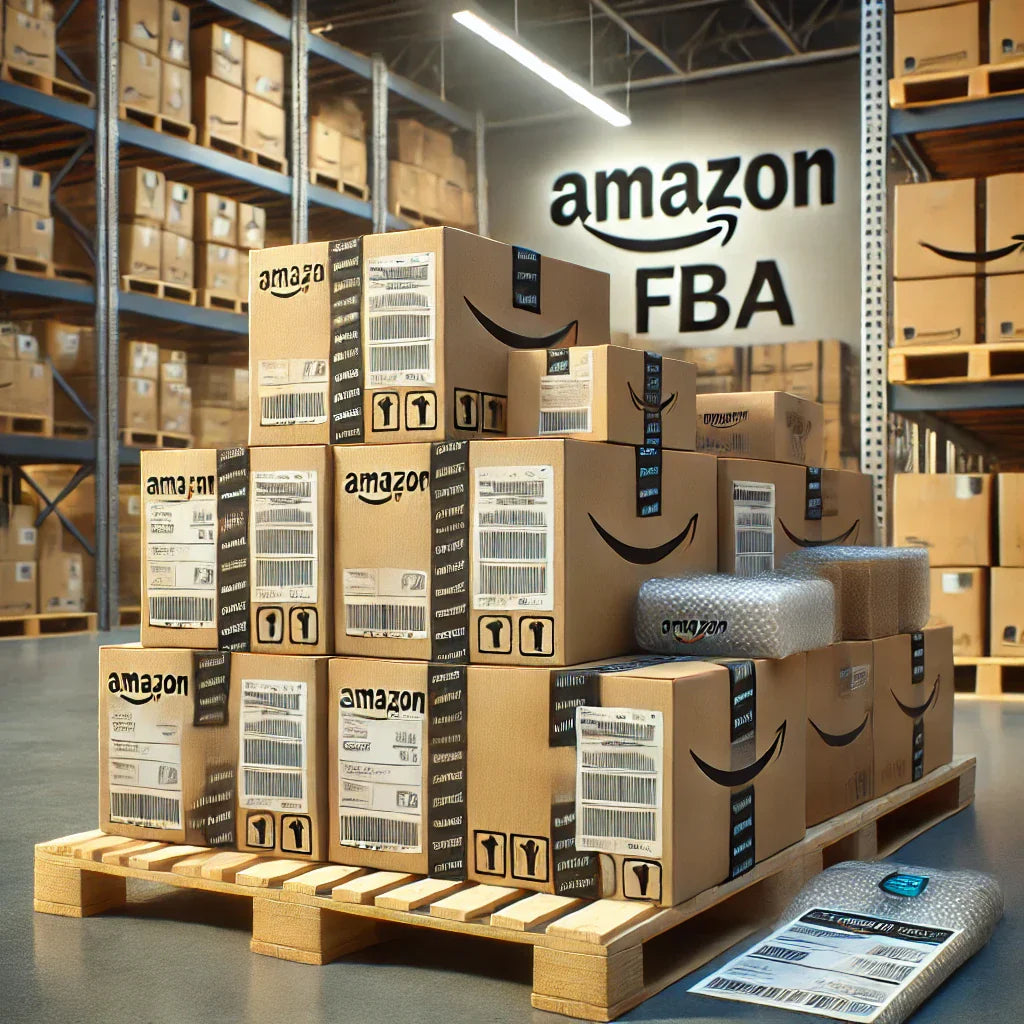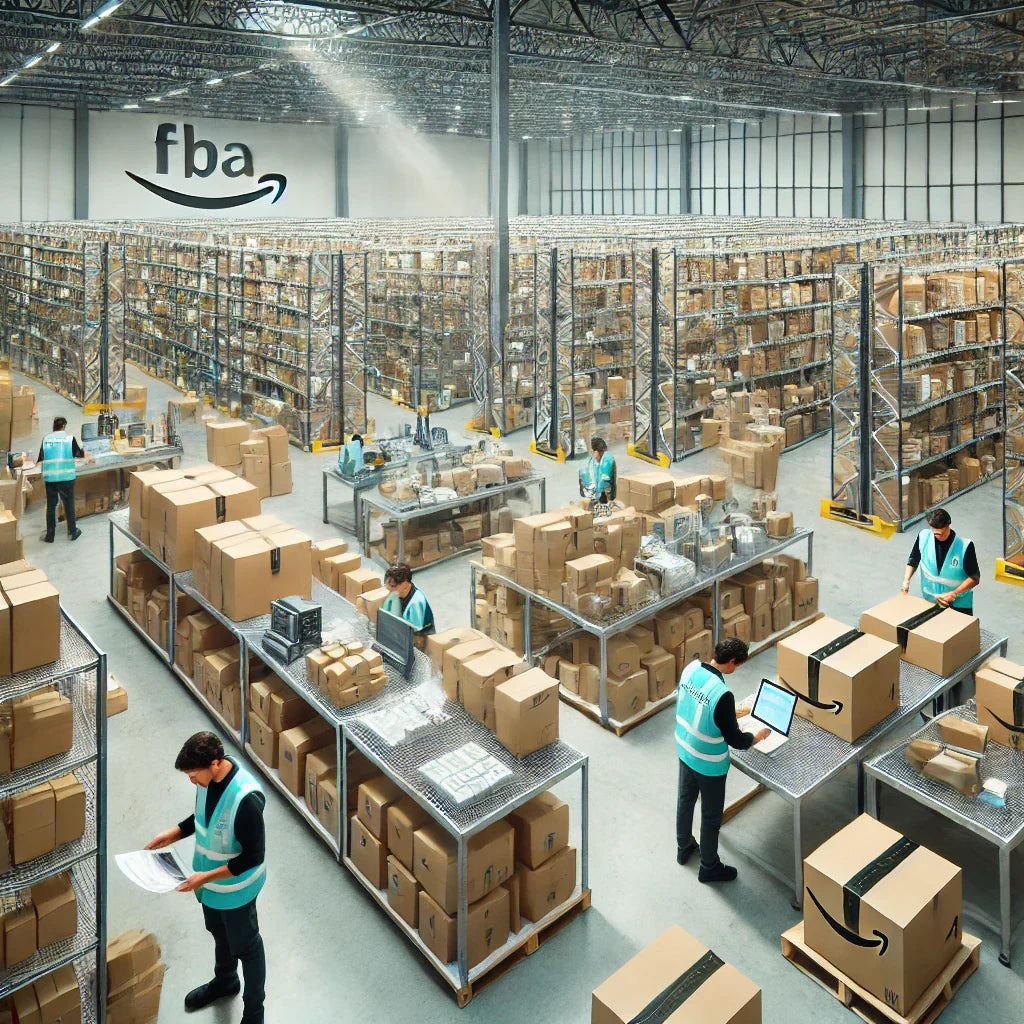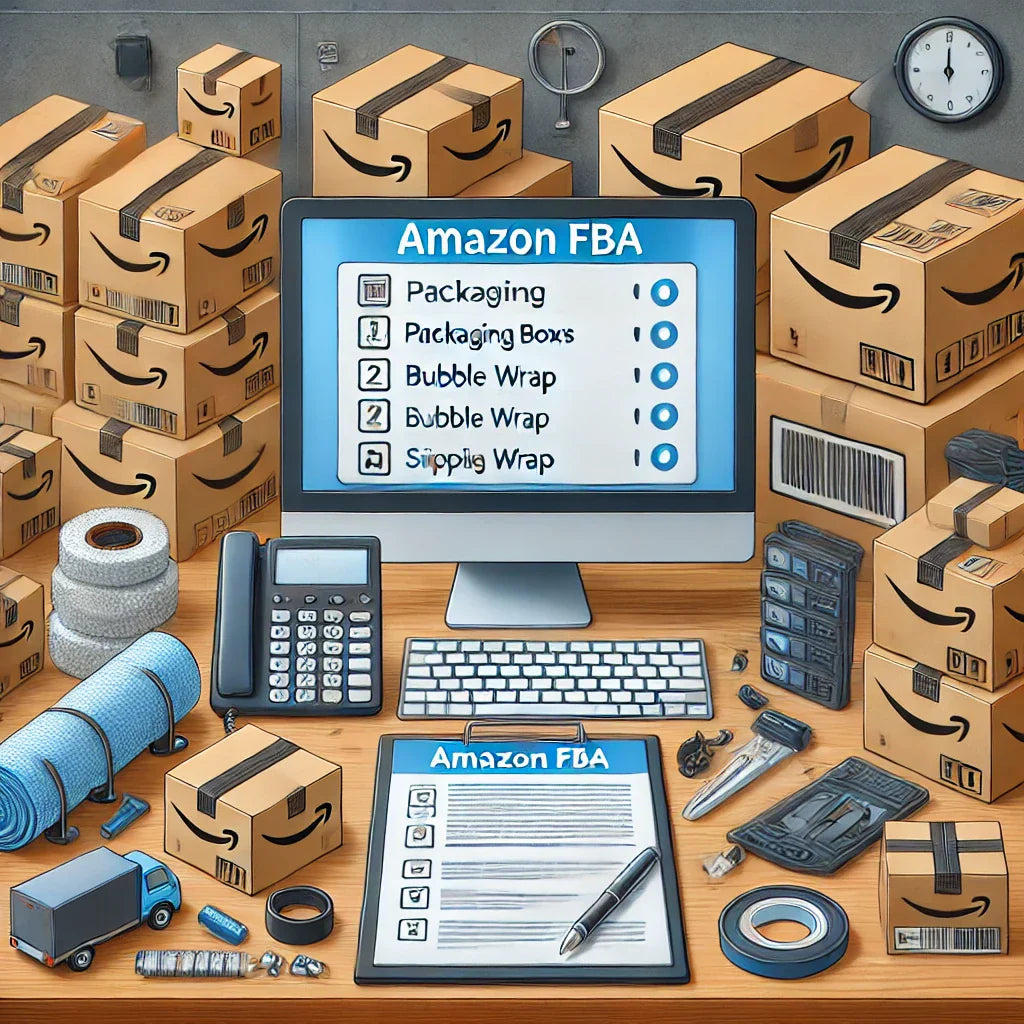As the e-commerce landscape becomes increasingly competitive, sellers are continuously looking for effective ways to streamline their operations and scale their businesses. For many, Amazon’s Fulfilled by Amazon (FBA) service has been a game-changer, offering unparalleled logistics and customer service support. However, with these benefits come stringent packaging and labeling requirements, making Amazon FBA prep centers a crucial asset for growing e-commerce businesses. These specialized facilities handle the complex preparation processes—inspections, labeling, bundling, and more—that Amazon mandates before products can reach fulfillment centers. By partnering with an FBA prep center, sellers can focus on core aspects of their business, such as marketing and product development, while ensuring compliance with Amazon’s standards and reducing the risk of costly delays or rejections. In this article, we explore how FBA prep centers provide indispensable support for scaling e-commerce ventures and optimizing operational efficiency.

The Role of Amazon FBA Prep Centers in E-commerce Success
As e-commerce businesses grow, managing product inventory, handling compliance requirements, and maintaining efficient order fulfillment can become daunting tasks. Amazon FBA prep centers specialize in managing these processes, allowing sellers to focus on other critical areas of their business. An FBA prep center handles a variety of tasks including:
- Product Inspection and Quality Control: Ensuring that items meet Amazon's stringent quality guidelines.
- Labeling and Barcoding: Preparing products with accurate labels to prevent delays in Amazon’s fulfillment centers.
- Bundling and Packaging: Complying with Amazon's packaging requirements to improve customer experience and streamline logistics.
These services play a crucial role in the scalability of an e-commerce business. Without the support of a prep center, e-commerce sellers might find it challenging to meet Amazon’s high standards, ultimately risking costly errors, delays, and even potential account suspensions.
Key Benefits of Using Amazon FBA Prep Centers
1. Ensuring Compliance with Amazon’s Requirements
Amazon has specific requirements for products to be eligible for the FBA program. Each product must meet criteria for labeling, barcoding, packaging, and shipping. Failing to adhere to these requirements can lead to penalties, delays, or returned products. FBA prep centers are experienced in handling Amazon's specifications and work to guarantee that every item sent to fulfillment centers is fully compliant.
This attention to detail helps sellers avoid operational interruptions, maintain high customer satisfaction levels, and ensure a seamless flow of inventory. By outsourcing these tasks, e-commerce businesses avoid the stress and risks associated with managing complex requirements, enabling them to focus on growth-driven initiatives.
2. Streamlining Operational Efficiency
E-commerce sellers benefit greatly from FBA prep centers by delegating time-consuming tasks, such as product preparation and inspection. This strategic move allows sellers to reduce manual labor and optimize their resources, driving greater operational efficiency.
With a streamlined process in place, businesses can allocate their time and resources toward product development, marketing, and customer engagement, which are critical components of scaling an e-commerce venture. Amazon FBA prep centers provide a valuable solution to support businesses in achieving a more efficient and profitable operation.
3. Reducing Costs and Increasing Profit Margins
For many sellers, managing their own product preparation can lead to higher costs due to labor, storage, and logistics. FBA prep centers typically offer flexible pricing structures that can be cost-effective compared to in-house prep solutions, especially as order volumes grow. By reducing operational costs associated with product preparation, businesses can increase their profit margins.
Furthermore, FBA prep centers can negotiate better rates with carriers for product shipping and storage, enabling sellers to benefit from reduced fees and improve profitability. Leveraging a prep center can thus be a financially advantageous move for e-commerce businesses aiming to scale.
How FBA Prep Centers Handle Quality Assurance and Inspection
Quality assurance is a vital aspect of the e-commerce fulfillment process. Amazon FBA prep centers conduct rigorous inspections to ensure that products meet quality and packaging standards. Quality inspections typically include:
- Product Verification: Checking each item for defects, damage, or missing components.
- Label Accuracy: Ensuring all labels are correct, clear, and compliant with Amazon's barcoding requirements.
- Packaging Inspection: Ensuring packaging materials protect items during transit and meet Amazon’s packaging guidelines.
Effective quality control not only reduces the likelihood of customer returns but also enhances customer satisfaction, which is crucial for achieving long-term success in e-commerce. With FBA prep centers handling these inspections, businesses can feel confident that their products will meet Amazon’s quality expectations.
The Strategic Advantage of FBA Prep Centers in Inventory Management
Inventory management is a key factor in successful e-commerce operations. Maintaining an optimal inventory level while ensuring products are available in Amazon's fulfillment centers can be challenging, especially for businesses with fluctuating demand. FBA prep centers assist in inventory management by:
- Receiving and Processing Shipments: Efficiently handling incoming shipments to avoid overstock or stockouts.
- Storage Solutions: Many prep centers offer short-term storage solutions, allowing sellers to keep their products closer to Amazon's fulfillment centers.
- Inventory Forecasting and Tracking: Offering insights into product demand trends, helping sellers plan their inventory needs more accurately.
Effective inventory management ensures that businesses can avoid costly delays, improve customer satisfaction, and maintain high rankings in Amazon’s algorithm, ultimately contributing to greater visibility and higher sales.
Enhancing Scalability with FBA Prep Centers
E-commerce businesses often face bottlenecks in scaling their operations due to resource limitations. FBA prep centers provide an infrastructure that allows businesses to grow without requiring them to invest heavily in warehousing, labor, or logistics. By outsourcing product preparation, companies can scale more easily and adapt to changes in demand without worrying about the challenges of an in-house fulfillment system.
FBA prep centers allow sellers to expand their product catalog and offer new products without needing to worry about additional logistical complexities. This flexibility enables sellers to capitalize on growth opportunities, respond to market demands, and ultimately build a more robust and resilient business model.
The Customer Experience Advantage of Using an FBA Prep Center
Customer satisfaction is essential in today’s competitive e-commerce environment. FBA prep centers play a crucial role in delivering a positive customer experience by ensuring that products are properly prepared, accurately labeled, and securely packaged. A reliable prep center helps businesses maintain consistency in their product presentation, which can positively impact customer reviews, ratings, and return rates.
By ensuring that products arrive on time and in excellent condition, FBA prep centers support businesses in creating a reliable and trusted brand image. This trust translates into higher customer loyalty, positive reviews, and ultimately, increased sales.
Common Misconceptions about Amazon FBA Prep Centers
Some e-commerce sellers hesitate to use FBA prep centers due to misconceptions about cost, control, and quality. Common myths include:
- “Prep Centers Are Too Expensive”: While there are costs associated with using a prep center, the efficiency and cost savings in terms of labor, storage, and logistics often outweigh the expense, especially for businesses with growing demand.
- “I Will Lose Control Over My Products”: Prep centers work in close collaboration with sellers and often provide transparent reporting and tracking, allowing businesses to maintain control over their inventory.
- “Prep Centers Don’t Maintain Quality”: Reputable FBA prep centers have stringent quality control measures to meet Amazon's requirements and ensure that products arrive at fulfillment centers in pristine condition.
Understanding the true benefits and dispelling misconceptions can help sellers make more informed decisions about integrating an FBA prep center into their business model.
Choosing the Right Amazon FBA Prep Center
Selecting the right FBA prep center is essential for maximizing efficiency and achieving business goals. Here are some factors to consider:
- Location: A prep center close to Amazon’s fulfillment centers can reduce shipping time and costs.
- Reputation and Experience: Choosing a reputable prep center with proven experience handling Amazon requirements is critical.
- Services Offered: Some prep centers offer additional services like kitting, bundling, or special labeling. Choosing one with relevant services can be beneficial.
- Technology and Transparency: Look for prep centers that offer inventory tracking and provide real-time data, allowing you to keep a close eye on your products.
- Pricing Structure: Comparing the costs and pricing models of different prep centers can help ensure the solution aligns with your budget and business model.
Taking the time to evaluate each prep center carefully will help businesses find a trusted partner for their growth journey.

How to Integrate an FBA Prep Center with Your E-commerce Business
Once you’ve selected an FBA prep center, integrating it into your e-commerce operations involves several strategic steps:
- Setting Clear Expectations: Define your requirements, quality standards, and desired outcomes from the beginning to ensure alignment with the prep center.
- Establishing Communication Protocols: Regular updates, reporting, and open communication channels help in monitoring the process and making adjustments as needed.
- Reviewing Inventory and Fulfillment Cycles: Work closely with the prep center to establish efficient inventory and fulfillment cycles that align with your business needs.
- Tracking Performance Metrics: Measure key performance indicators such as turnaround time, error rates, and customer feedback to assess the prep center’s impact on your business.
By strategically integrating an FBA prep center, e-commerce businesses can create a seamless workflow, improve efficiency, and enhance customer satisfaction.
The Long-Term Benefits of Partnering with Amazon FBA Prep Centers
As e-commerce businesses evolve, the need for strategic partnerships becomes more pronounced. Amazon FBA prep centers provide significant long-term benefits that go beyond immediate operational support. These centers are not just intermediaries in the fulfillment process; they become integral parts of a company’s growth strategy. Here’s how partnering with a prep center can benefit a business over the long term:
1. Continuous Adaptation to Amazon’s Evolving Requirements
Amazon regularly updates its policies and requirements for FBA sellers, particularly as it expands its marketplace and refines its standards. Staying up-to-date with these changes can be time-consuming and complex. FBA prep centers keep track of Amazon’s evolving standards and adapt their processes to ensure compliance. By partnering with a prep center, e-commerce businesses benefit from the prep center’s commitment to staying informed, helping to avoid disruptions and maintain smooth operations over the long term.
2. Building a Scalable Fulfillment Model
A key challenge for growing e-commerce businesses is scaling their fulfillment processes without sacrificing quality or efficiency. Prep centers offer scalable solutions that allow businesses to manage seasonal fluctuations, new product launches, and expanding catalogs without requiring significant in-house investments. This scalability ensures that e-commerce companies can grow seamlessly, regardless of changes in demand or product volume.
3. Developing Specialized Packaging and Branding
In a competitive market, distinct packaging and branding can set a business apart. Many FBA prep centers offer specialized packaging services that comply with Amazon’s guidelines while also meeting the seller's branding requirements. Custom packaging options, kitting, and bundling allow e-commerce businesses to create a memorable unboxing experience for their customers, enhancing brand loyalty and customer satisfaction. Over time, this focus on branding can lead to a more recognizable brand identity, which is invaluable in a crowded e-commerce space.
4. Enhanced Inventory Planning and Demand Forecasting
Inventory management is a critical component of long-term e-commerce success. Prep centers often have robust systems for tracking inventory and predicting demand, which are particularly beneficial for sellers operating in volatile or seasonal markets. By leveraging data from the prep center’s forecasting tools, e-commerce businesses can make informed decisions on stock levels, minimize the risk of stockouts or overstocking, and improve cash flow management.
Exploring Specialized Services Offered by Amazon FBA Prep Centers
FBA prep centers offer a range of specialized services that go beyond standard preparation, packaging, and labeling. These services are designed to meet specific business needs and can provide a competitive advantage. Here are some of the key specialized services available:
Kitting and Bundling Services
Kitting and bundling involve combining multiple products into a single package or set. These services are especially useful for businesses that want to offer product bundles or exclusive kits. FBA prep centers ensure that each kit is packaged according to Amazon’s standards and includes accurate labeling, reducing the risk of errors and ensuring that customers receive exactly what they ordered.
Custom Packaging and Inserts
Many FBA prep centers allow sellers to add custom packaging and inserts, such as thank-you notes or promotional materials. These small touches can greatly enhance the customer experience and encourage repeat purchases. Custom packaging not only complies with Amazon’s strict guidelines but also adds a personal touch that reinforces brand identity.
Returns Processing and Management
Handling returns can be a time-consuming process that disrupts business operations. Many FBA prep centers offer returns processing and management as part of their service. When a product is returned to the prep center, it can be inspected, repackaged, and restocked if it meets quality standards. This process helps sellers avoid potential revenue loss and ensures that only high-quality products remain in circulation.
Compliance and Hazardous Material Handling
Some products require special handling due to their composition or industry regulations. FBA prep centers with experience in hazardous material handling can safely prepare, package, and label these products to meet Amazon’s requirements. This service is essential for sellers who deal with beauty products, chemicals, or electronics, ensuring that their items are handled in accordance with Amazon’s guidelines and government regulations.
The Role of FBA Prep Centers in International E-commerce Expansion
Expanding into international markets can be a lucrative opportunity for e-commerce sellers. However, selling products across borders comes with additional logistics, compliance, and customs challenges. Amazon FBA prep centers play an invaluable role in supporting sellers as they navigate the complexities of global expansion.
Ensuring Compliance with International Standards
Each country has its own regulations for imported goods, including packaging, labeling, and safety requirements. FBA prep centers are familiar with international shipping guidelines and work to ensure that all products meet the necessary standards for the target market. This compliance minimizes the risk of delays, customs rejections, or fines, making international expansion smoother and more efficient.
Managing Cross-Border Shipping and Customs
Cross-border shipping can involve complex customs processes and additional paperwork. FBA prep centers with experience in international logistics can assist sellers by preparing the required documentation, managing shipping schedules, and ensuring timely delivery. This support streamlines cross-border shipping and reduces the administrative burden on e-commerce businesses, allowing them to focus on marketing and customer engagement in new regions.
Localized Packaging and Labeling
In some cases, products may require localized packaging, language-specific labels, or special packaging materials to comply with regional regulations. FBA prep centers can help sellers meet these requirements, enhancing the likelihood of product acceptance in international markets. By working with a prep center that offers localization services, e-commerce businesses can create products that resonate with international customers and build trust in new markets.
Addressing Inventory Challenges with the Support of FBA Prep Centers
Inventory management is one of the most common pain points for e-commerce businesses. FBA prep centers offer valuable solutions to help sellers address common inventory challenges, particularly in the context of Amazon FBA’s strict guidelines. Here are some ways in which prep centers assist with inventory management:
Efficient Inventory Turnover
Managing inventory turnover is essential for maintaining cash flow and avoiding storage fees. FBA prep centers help sellers by optimizing the speed at which inventory is processed, labeled, and sent to Amazon fulfillment centers. This quick turnaround reduces the risk of backlogs and minimizes storage fees, allowing sellers to keep more cash available for reinvestment in their business.
Batch Tracking and Lot Control
For sellers dealing with perishable goods, cosmetics, or other items with expiration dates, tracking inventory batches is critical. FBA prep centers can implement batch tracking and lot control systems to monitor expiration dates, ensuring that only fresh products are sent to Amazon’s fulfillment centers. This practice helps prevent expired products from reaching customers, protecting the seller’s reputation and ensuring compliance with Amazon’s standards.
Reordering and Restocking Insights
FBA prep centers that offer inventory tracking often provide valuable insights into reorder points and restocking needs. By analyzing sales trends and current inventory levels, prep centers can help sellers determine the optimal time to reorder products, reducing the likelihood of stockouts and overstocking. This data-driven approach to inventory management allows businesses to operate more efficiently and avoid potential revenue losses due to unavailable products.
The Economic Impact of FBA Prep Centers on E-commerce Growth
FBA prep centers contribute significantly to e-commerce growth, particularly for small and medium-sized businesses. By providing affordable services that streamline operations, prep centers reduce the financial barriers to entry for many e-commerce sellers. Here’s how FBA prep centers have a positive economic impact on e-commerce businesses:
Reducing Overhead Costs
Operating an in-house product preparation facility requires significant investment in warehouse space, staff, and equipment. For small e-commerce businesses, these costs can be prohibitive. FBA prep centers eliminate the need for in-house facilities, providing cost-effective solutions that help sellers manage their budgets more efficiently.
Enabling Profitability at Scale
As e-commerce businesses grow, so do their order volumes. Fulfilling a large volume of orders can strain in-house facilities and lead to increased labor costs. FBA prep centers are designed to handle high order volumes efficiently, allowing businesses to scale their operations without incurring additional overhead. This scalability enhances profitability, making it possible for e-commerce businesses to expand sustainably.
Offering Flexible Pricing Options
Many FBA prep centers offer tiered pricing structures based on the services required and the volume of orders processed. This flexibility allows businesses to pay only for the services they need, making it easier to manage expenses and invest in other areas of growth. Whether a business is just starting out or preparing for a peak sales season, prep centers offer cost-effective options that align with the seller’s budget and goals.

Integrating Technology for Optimized FBA Prep Center Services
Modern FBA prep centers leverage technology to enhance their services and offer greater transparency to e-commerce businesses. Advanced technology tools not only streamline the prep process but also provide sellers with valuable data for strategic decision-making. Key technological advancements include:
Inventory Management Software
Inventory management software allows prep centers to track products accurately and provide sellers with real-time updates on inventory levels. This technology minimizes errors, reduces the risk of stockouts, and ensures that businesses have access to accurate data for inventory planning.
Automated Labeling and Scanning Systems
Automated labeling and scanning systems speed up the preparation process by ensuring that each product is labeled accurately and efficiently. These systems reduce manual errors, ensuring compliance with Amazon’s requirements while saving time. Sellers benefit from faster turnaround times, which is crucial in meeting customer demands and maintaining optimal inventory flow.
Data Analytics for Predictive Demand Forecasting
Data analytics tools enable prep centers to analyze sales trends, seasonal patterns, and other variables that impact demand. Predictive demand forecasting helps sellers plan inventory more effectively, minimizing the risk of stockouts and reducing excess inventory. This technology-driven approach to demand forecasting is particularly valuable for businesses in competitive or seasonal markets, allowing them to stay agile and responsive to customer needs.
Building a Strong Partnership with Your FBA Prep Center for Long-Term Success
Creating a successful partnership with an Amazon FBA prep center is not simply a transactional arrangement; it’s a strategic collaboration that requires careful planning, transparent communication, and mutual understanding. For e-commerce sellers looking to leverage the full potential of an FBA prep center, here are several best practices that can lead to a productive, long-term partnership:
1. Establish Clear Goals and Expectations
Before engaging a prep center, clearly define your business goals, inventory needs, and quality standards. Outline what you expect from the partnership in terms of service levels, turnaround times, and communication. Having these expectations in place creates a foundation for accountability and ensures that both parties are aligned on the key objectives.
Discussing specific needs, such as whether your products require special handling, custom packaging, or additional quality checks, can help the prep center understand your unique requirements. When expectations are set upfront, it reduces the likelihood of misunderstandings and enhances the overall efficiency of the partnership.
2. Prioritize Open and Consistent Communication
Effective communication is critical for managing any third-party relationship, especially one as integral to your business operations as a prep center. Regular updates, timely responses, and transparent reporting are essential for maintaining an efficient flow of information. Some businesses prefer weekly meetings or monthly check-ins to ensure that both parties are informed about any potential changes in requirements or workflows.
Establishing communication protocols, including preferred methods of contact and response times, can also streamline processes. Many FBA prep centers offer account managers who serve as a direct point of contact, simplifying communication and enhancing response times. Open communication allows both parties to adapt quickly to shifts in demand, seasonal peaks, or policy changes.
3. Leverage Technology to Enhance Transparency and Efficiency
Many leading FBA prep centers offer inventory management and tracking technology that enables e-commerce businesses to monitor their inventory in real-time. By integrating with these systems, sellers can have greater visibility into inventory levels, order processing status, and shipment tracking. This transparency allows businesses to respond quickly to stock needs and plan their replenishment cycles more effectively.
For instance, if a product is experiencing high demand, inventory tracking software allows the seller to monitor stock levels and arrange for additional shipments as needed. This proactive approach minimizes the risk of stockouts, maintains customer satisfaction, and keeps the business competitive in the marketplace.
4. Monitor Performance and Set Key Performance Indicators (KPIs)
To gauge the effectiveness of your partnership with an FBA prep center, it’s essential to set and monitor KPIs that align with your business objectives. Common performance metrics include:
- Turnaround Time: The speed at which products are processed and sent to Amazon’s fulfillment centers.
- Error Rate: The frequency of mislabeling, incorrect packaging, or quality issues.
- Order Accuracy: Ensuring that each order is prepared correctly and meets Amazon’s requirements.
- Customer Satisfaction: Evaluating customer feedback and return rates to identify any areas of improvement.
Regularly reviewing these KPIs provides insight into the prep center’s performance and helps identify opportunities for optimization. If certain metrics fall below expectations, discussing these issues with the prep center can lead to targeted solutions that improve efficiency.
5. Collaborate on Seasonal Planning and Demand Forecasting
E-commerce businesses often experience seasonal spikes in demand, such as during holidays, promotions, or specific industry-related events. Effective seasonal planning requires coordination with the prep center to ensure that there is adequate inventory and that shipments are processed smoothly during peak periods.
FBA prep centers with experience in seasonal forecasting can help businesses anticipate demand, adjust their inventory levels, and prepare for increased order volumes. By collaborating on these forecasts, businesses can maintain customer satisfaction during busy seasons and maximize revenue opportunities without overwhelming the fulfillment process.
6. Review Contract Terms and Ensure Flexibility
When entering into a partnership with an FBA prep center, it’s important to carefully review the contract terms, including pricing, service levels, and termination clauses. Some contracts offer flexible options that allow sellers to scale services up or down based on seasonal demand or business growth. Flexibility is crucial for businesses that experience fluctuating order volumes, as it provides the freedom to adjust services without incurring penalties.
Additionally, ensure that the contract terms cover any additional services that may be required in the future, such as international shipping support, kitting, or returns processing. This proactive approach ensures that the prep center can continue to meet your business needs as they evolve.
Addressing Common Challenges When Working with FBA Prep Centers
While FBA prep centers offer numerous benefits, there are challenges that may arise in the partnership. Identifying these challenges and proactively addressing them can lead to a smoother and more successful collaboration.
Managing Quality Control and Product Standards
Maintaining high product quality is essential for preserving brand reputation and ensuring customer satisfaction. Some e-commerce sellers may worry that outsourcing product preparation could lead to inconsistent quality. To address this, work closely with the prep center to establish quality control protocols, such as specific inspection criteria, defect rates, and product handling guidelines.
Request regular quality control reports or conduct periodic quality checks to confirm that the prep center meets your standards. If you observe any inconsistencies, discuss corrective actions promptly to prevent recurring issues.
Balancing Costs with Value
One of the primary concerns for businesses is ensuring that the costs associated with using an FBA prep center are justified by the value provided. While prep centers offer cost savings by reducing labor and storage expenses, it’s important to continuously evaluate whether the services are providing a return on investment.
By regularly reviewing your operational costs, including labor, packaging, and logistics, you can compare the financial impact of using a prep center versus handling these tasks in-house. Additionally, some prep centers offer tiered pricing or discounts based on volume, so consider negotiating terms that align with your business’s budget.
Adjusting to Inventory Discrepancies and Lost Shipments
Inventory discrepancies or lost shipments can occasionally occur when working with a third-party prep center. These issues can lead to stockouts, delayed shipments, and dissatisfied customers. To minimize this risk, choose a prep center with robust inventory management systems and tracking capabilities. Regular inventory audits can also help detect discrepancies early, allowing for quick resolution.
When discrepancies or losses do happen, having clear policies in place for managing these situations is essential. Many prep centers have insurance or reimbursement policies to cover lost or damaged goods, so review these policies before finalizing your agreement.
![]()
Preparing for the Future: Trends in FBA Prep Center Services
As e-commerce continues to evolve, FBA prep centers are also adapting to meet new industry demands. Sellers can expect to see several emerging trends in prep center services that reflect shifts in consumer preferences, logistics technology, and Amazon’s policies. Staying aware of these trends can help e-commerce businesses make strategic decisions and stay competitive.
Sustainability and Eco-Friendly Packaging
With growing consumer interest in sustainability, many FBA prep centers are starting to offer eco-friendly packaging options. Sustainable practices include using recycled materials, minimizing plastic, and reducing overall packaging waste. Eco-conscious businesses can collaborate with prep centers to implement packaging solutions that align with their environmental goals, which can resonate with customers and enhance brand loyalty.
Automation and AI Integration
Automation and AI are transforming the logistics and fulfillment sectors. Advanced prep centers are beginning to incorporate robotic systems for tasks such as labeling, sorting, and packaging, which can lead to faster processing times and reduced labor costs. AI-driven analytics also provide enhanced demand forecasting, allowing businesses to plan inventory more accurately and avoid stockouts or overstocking.
Multi-Channel Fulfillment Support
As e-commerce businesses expand across multiple sales channels, there is an increasing demand for multi-channel fulfillment support. Many FBA prep centers are expanding their services to accommodate sales beyond Amazon, allowing sellers to reach customers on platforms like eBay, Shopify, and Walmart. This multi-channel approach gives sellers the flexibility to manage their inventory and orders from a single prep center, streamlining operations and simplifying logistics.
Enhanced Reporting and Real-Time Data Access
In today’s data-driven market, access to real-time data is essential for making informed business decisions. Prep centers are adopting advanced reporting tools that provide sellers with detailed insights into inventory levels, order status, processing times, and performance metrics. Enhanced reporting capabilities allow businesses to optimize their inventory planning, respond to demand changes, and monitor the prep center’s performance in real-time.
Real-Life Case Studies: E-commerce Success Stories with FBA Prep Centers
To illustrate the tangible benefits of using FBA prep centers, consider these real-life case studies of e-commerce businesses that have leveraged prep centers to achieve growth and operational efficiency.
Case Study 1: Scaling a Beauty Brand with Quality Control Support
A beauty brand with a fast-growing product line encountered difficulties in maintaining quality standards due to increasing order volumes. After partnering with an FBA prep center that specialized in cosmetics, the brand was able to implement rigorous quality control measures, including product inspections, defect tracking, and specialized handling. As a result, the business reduced its return rate by 30% and gained a competitive edge in a crowded market.
Case Study 2: Expanding to International Markets with Localized Packaging
A U.S.-based electronics company saw an opportunity to expand into the European market but faced challenges in meeting regional packaging and labeling requirements. By working with an FBA prep center that provided localized packaging solutions and managed cross-border shipping, the company successfully launched its products in Europe. This expansion increased the company’s revenue by 25% within the first year and established a foothold in a lucrative new market.
The Importance of Quality Assurance in FBA Prep Centers for Customer Satisfaction
Quality assurance is a critical component of the e-commerce fulfillment process, as it directly impacts customer satisfaction, brand reputation, and overall business success. In a competitive market, customers expect consistent quality and reliability from online sellers. When e-commerce businesses outsource product preparation to an Amazon FBA prep center, they entrust this vital responsibility to the third party. Here’s how quality assurance practices at FBA prep centers ensure customer satisfaction and protect business growth:
Ensuring Consistency in Product Presentation
Every product reaching Amazon’s fulfillment centers must meet specific presentation standards to ensure a consistent unboxing experience for customers. FBA prep centers are equipped to handle product-specific requirements, such as packaging, labeling, and sealing, which contribute to a consistent brand experience. By adhering to these standards, prep centers reduce the likelihood of customer complaints and negative reviews, enhancing a business’s credibility.
Prep centers may also offer specialized quality control for products with unique packaging needs. For example, some items require protective materials to prevent damage, while others benefit from packaging that enhances the visual appeal. These tailored solutions reinforce the brand’s commitment to quality, helping to increase customer loyalty.
Mitigating the Risk of Defective Products
Defective or damaged products can harm customer trust and lead to higher return rates. FBA prep centers minimize this risk by implementing rigorous quality control checks during the preparation process. These checks include inspections for visible defects, functionality tests (if applicable), and assessments of packaging integrity. By catching these issues before they reach Amazon’s fulfillment centers, prep centers prevent defective products from reaching customers, ultimately safeguarding the brand’s reputation.
Reducing Returns and Enhancing Customer Retention
Returns are a costly and time-consuming process for e-commerce businesses. Not only do returns increase operational costs, but they can also damage customer relationships. FBA prep centers that focus on quality assurance help reduce return rates by ensuring that products meet customer expectations. A well-prepared product is less likely to be returned, leading to higher customer satisfaction and retention rates.
Satisfied customers are more likely to become repeat buyers and recommend the brand to others, creating valuable word-of-mouth marketing. This retention effect is especially beneficial for businesses aiming to build a loyal customer base over the long term.
The Financial Advantages of Using an Amazon FBA Prep Center
Investing in an Amazon FBA prep center offers not only logistical benefits but also significant financial advantages. For many e-commerce businesses, these financial gains go beyond cost savings and contribute to a more sustainable growth model. Here’s how FBA prep centers drive financial benefits:
Minimizing Labor and Overhead Costs
Operating an in-house preparation facility involves significant labor costs, as well as expenses related to training, facility maintenance, and equipment purchases. By outsourcing these tasks to a prep center, businesses reduce overhead and free up resources for other essential areas such as marketing, product development, or customer service.
This reduction in operational expenses is particularly beneficial for small to medium-sized e-commerce businesses that are seeking to expand without stretching their budgets. With a prep center handling complex logistics, sellers can focus on scaling their business without incurring prohibitive costs.
Reducing Amazon Storage and Fulfillment Fees
Amazon charges storage fees based on the volume of products stored in its fulfillment centers. Products that sit in storage for extended periods incur additional long-term storage fees, which can be costly. Many FBA prep centers offer short-term storage solutions and staggered shipping options, which help reduce these storage fees by ensuring that only the necessary quantity of products is sent to Amazon’s warehouses.
Prep centers allow sellers to send inventory in smaller, more manageable quantities based on demand forecasting. This strategy minimizes storage fees, reduces the risk of overstocking, and helps businesses avoid the higher costs associated with Amazon’s long-term storage charges.
Improved Cash Flow Through Faster Inventory Turnover
Cash flow is vital for any business, particularly in the e-commerce sector where inventory turnover can impact profitability. By leveraging FBA prep centers, e-commerce businesses benefit from faster inventory processing, which in turn leads to a quicker turnover rate. Products move from prep centers to Amazon’s fulfillment network more swiftly, reducing time spent in storage and increasing the speed of order fulfillment.
Faster inventory turnover improves cash flow by enabling businesses to generate revenue from products sooner. This efficiency is crucial for sellers who need to reinvest in inventory and other growth-related expenses, supporting a continuous cycle of expansion and profitability.
Access to Bulk Shipping Discounts
Many FBA prep centers manage high order volumes and often have partnerships with shipping carriers. As a result, they can access bulk shipping discounts that are typically unavailable to smaller businesses. These discounts translate into lower shipping costs for e-commerce sellers, which can significantly impact the bottom line, especially for businesses with large or heavy products.
Additionally, the savings from these bulk shipping rates can be reinvested in the business or passed on to customers in the form of reduced shipping costs, creating a competitive advantage in pricing.

Conclusion
In the dynamic world of e-commerce, Amazon FBA prep centers have emerged as essential partners for businesses aiming to scale efficiently, reduce operational complexities, and enhance customer satisfaction. By handling crucial aspects of inventory preparation, from inspection and labeling to packaging and compliance, these prep centers allow sellers to focus on strategic growth initiatives rather than logistical challenges. Not only do they ensure compliance with Amazon’s stringent standards, but they also provide cost-saving benefits, quality assurance, and enhanced flexibility for inventory management. Additionally, with options for customized packaging, international fulfillment, and seamless integration with multi-channel sales, FBA prep centers enable e-commerce brands to create a memorable customer experience and expand their reach.
For e-commerce sellers looking to strengthen their operations and achieve sustainable growth, partnering with a reliable Amazon FBA prep center offers a strategic advantage that can set them apart in a competitive marketplace. By outsourcing complex tasks and benefiting from the specialized expertise of a prep center, businesses can streamline their workflows, maximize profitability, and position themselves for long-term success in the fast-paced world of online retail.
Read More
- A Complete Guide to Amazon FBA Preparation: Essential Steps for Success
- Top Amazon FBA Prep Tips: How to Streamline Your Process for Maximum Efficiency
- Amazon FBA Packaging Guidelines: Key Requirements for Safe and Compliant Shipments
- The Cost of Amazon FBA Preparation: Budgeting Tips for New Sellers
- Choosing the Right Amazon FBA Prep Service for Your Business Needs
- How to Avoid Common Amazon FBA Prep Mistakes: Expert Advice for Sellers







